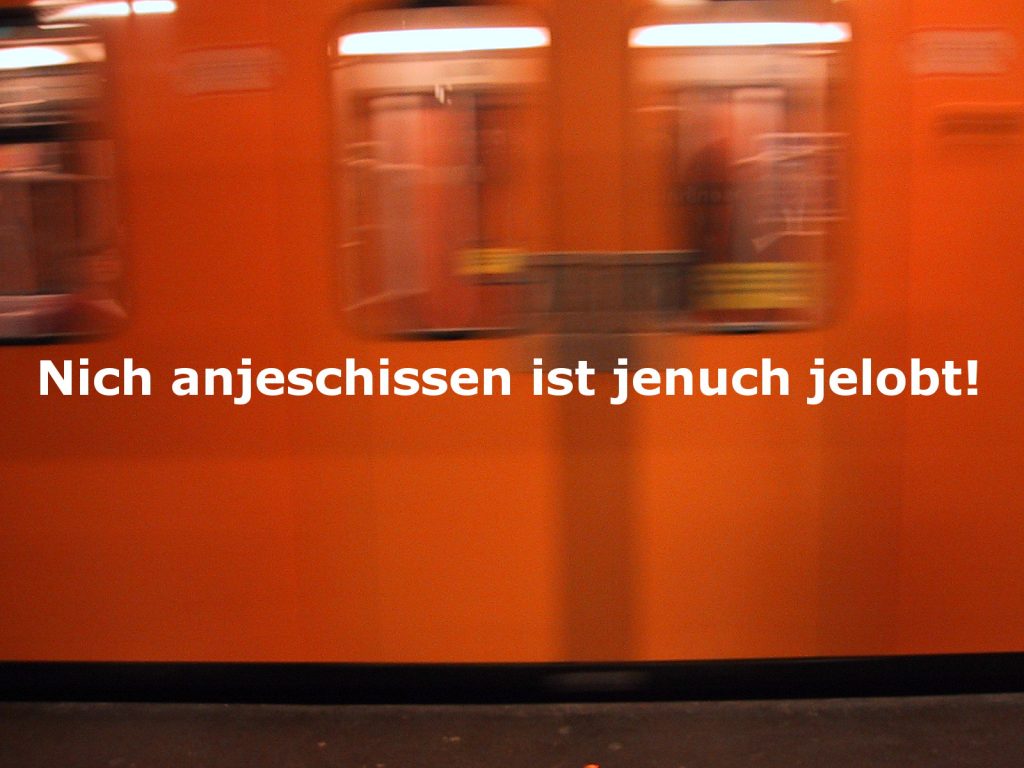Nothing defines native Berliners more than their accent, known as Berlinerisch. The accent is more than just a staccato ending to words and pronouncing Gs as if they were Js. Berlinerisch is also an attitude that combines indifference, hostility and humor in differing degrees. As an outsider, I often sense more hostility where there’s more indifference and, as a humorist, I’m often jealous of the quick wit sometimes injected into mundane situations.
Berlinerisch is best summed up by a popular Berlin saying: “Nich anjeschissen ist jenuch jelobt,” or: Not insulting you was compliment enough. It’s like the city saying to you: If I didn’t call you an asshole, I must like you. Now shut up and eat your Currywurst. It’s like hanging out with an old man.

Once, a gay friend and his then-boyfriend were visiting from London. We’ll call them Scott and James, because that’s their names. We took them for beers in Schöneberg since Cologne was too far. The idea was to knock back a few and then head home, leaving Scott and James to explore Schöneberg. After the first beer, Scott said he wanted to start exploring early while we were around in case he had any questions.
Turns out, he would have questions.
He headed to a bar called New Action around the corner alone.
A few minutes later he stormed back, flustered.
“You would not believe how that bartender treated me!” he said, and recounted his story. He had been alarmed by a sign announcing a dresscode outside the bar – patrons must wear pants and a shirt, it said. Scott met the code but James did not. Scott thought he’d ask the staff how serious the dresscode was.
“I’m dressed OK but my boyfriend just has on shorts and a t-shirt – can he still come in?” he asked the barkeep.
“I don’t know,” the bartender snapped back in English, backed by Berlinerisch. “IS HE HUMAN?”
To which Scott took immediate offense. He understood the tone and the generalizing as an invitation for him to leave and a hint that his boyfriend would not be welcome.
My wife laughed: “He was trying to tell you that everyone is welcome. It’s fine.”
“Are you sure? It’s like he barked it at me. I think he hates me.”
“Welcome to Berlin,” my wife said. “Go back with James and if you don’t get in we’ll go somewhere else, otherwise we’ll see you when you get home.”
We didn’t see them until the next morning.
Berlinerisch: Se können hier schwimmen …
Another time I stopped at a combination café and Spätkauf (convenience store) in Mitte for a quick machine-generated coffee while I waited for an appointment. It was the kind of spartanly decorated place that opened shortly after the Wall fell and was staffed by robust, well-built women who can operate heavy machinery, slaughter all kinds of livestock with a pocketknife and make perfect Schwarzwälder Kirschtorten.
After a few minutes an aging gentleman entered. He was clearly from somewhere in Lower Saxony (probably Hannover but maybe Detmold) and was probably visiting an adult offspring who had recently located to the Hauptstadt. He was neatly but not fashionably dressed and probably drove a C-Class Mercedes. Germans would recognize him as a special breed known as a Spiesser, which is best translated as “squares” but is most often referred to by their colloquial title: Dad.
“Excuse me,” the man said to the ladies behind the counter.
“Ja!” they bellowed back. In normal customer service the “ja” would be couched as a polite question. In Berlinerisch, it’s intimidation.
“Can one drink a coffee here?” he asked.
I almost pitied him.
“You could go swimming here if you brought enough water!” the woman behind the counter bellowed in perfect Berlinerisch.
The man turned bright red and stammered a bit. He may have been close to tears.
The woman saved him from herself: “Black or with milk?” she wanted to know.
He ended up ordering some bread with cheese as well.
“Is everyone here like that?” he asked me. He was realizing all the documentaries, news reports and first-hand reports of Berlinerisch he’d seen were true.
“Yes,” I said.
“Interesting,” he answered.
It always is, I said. It always is.
2 Comments